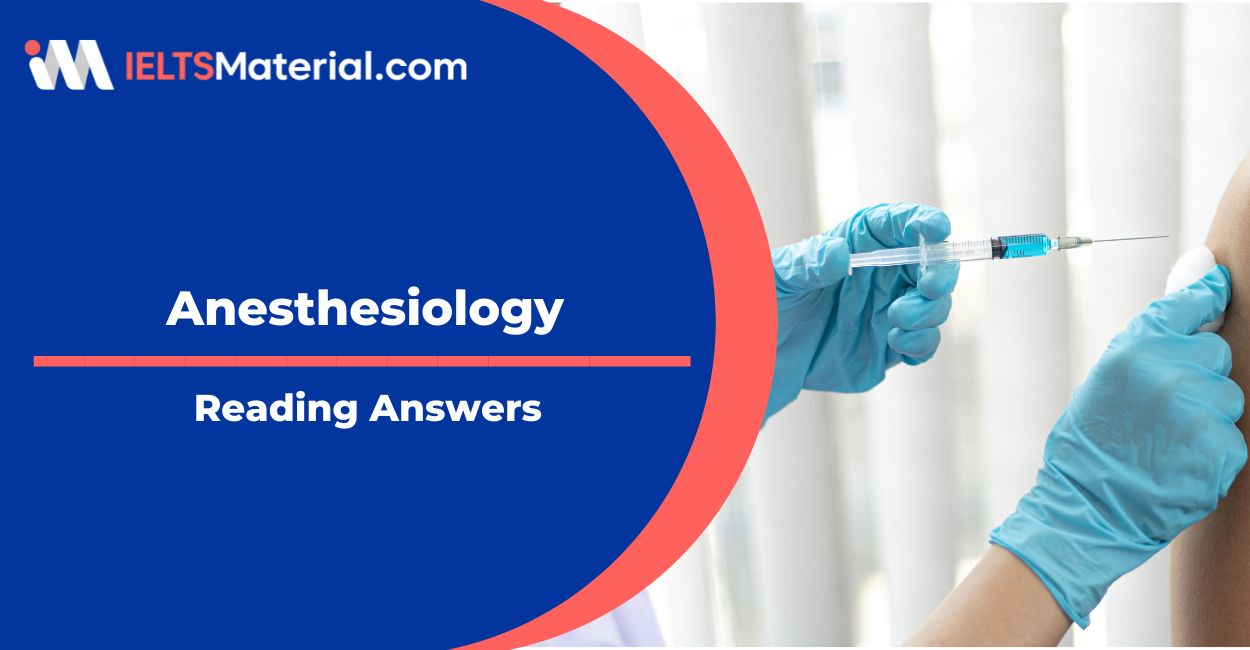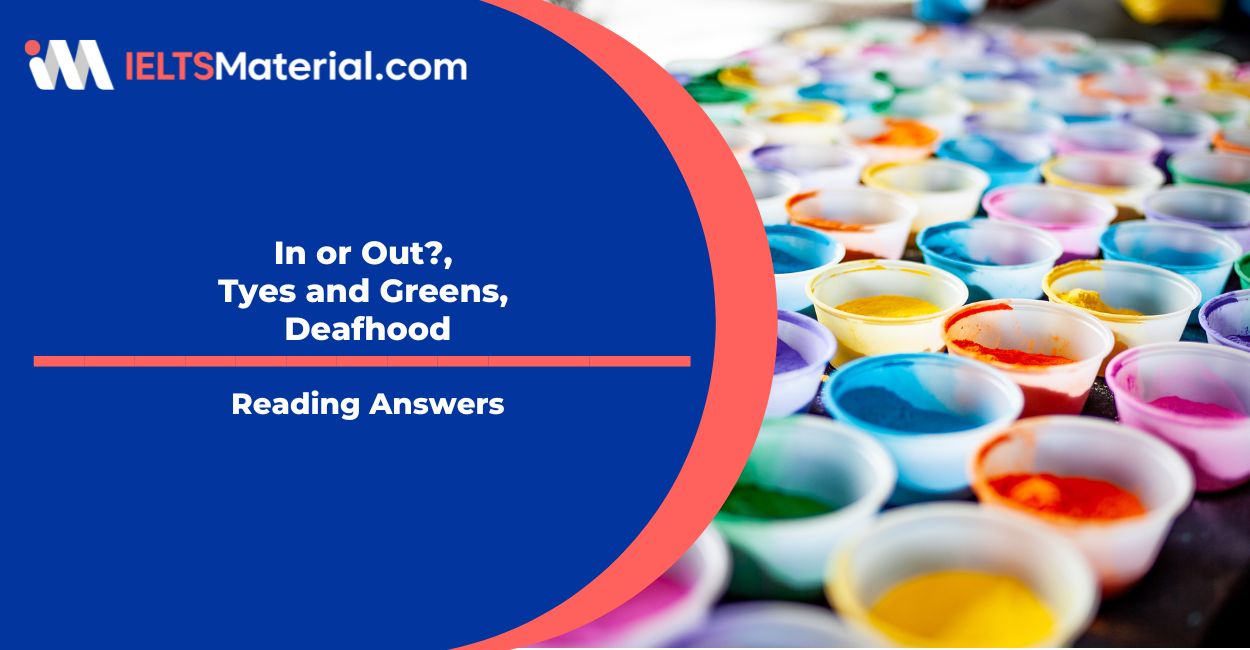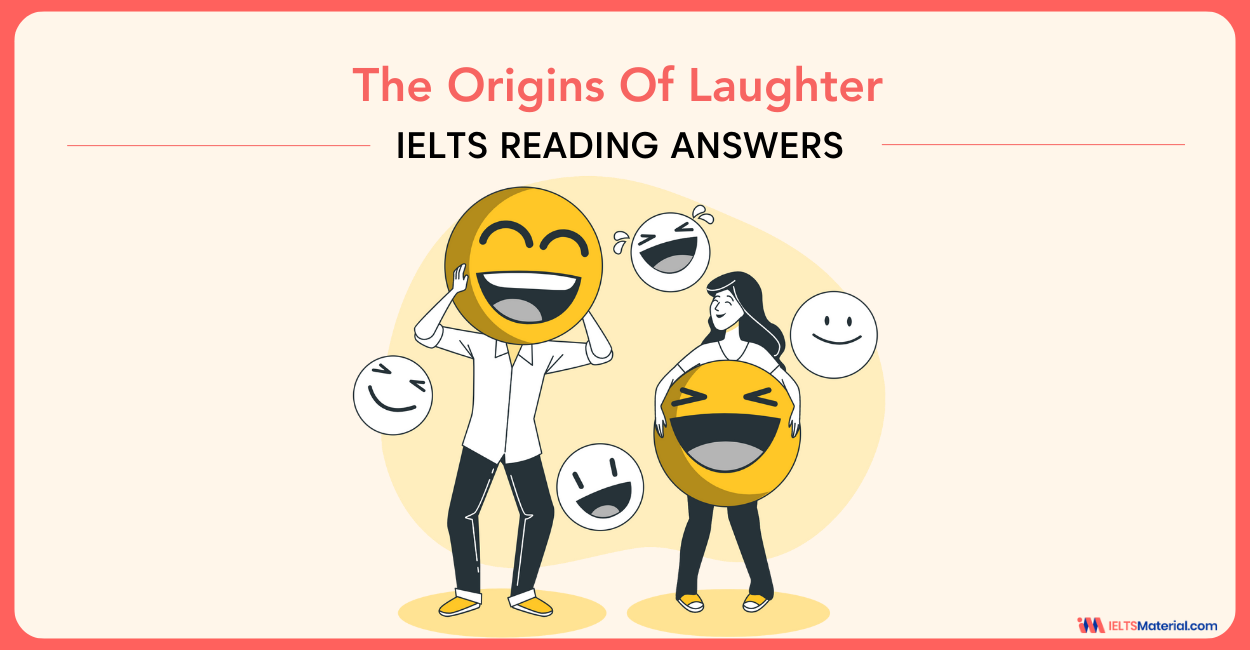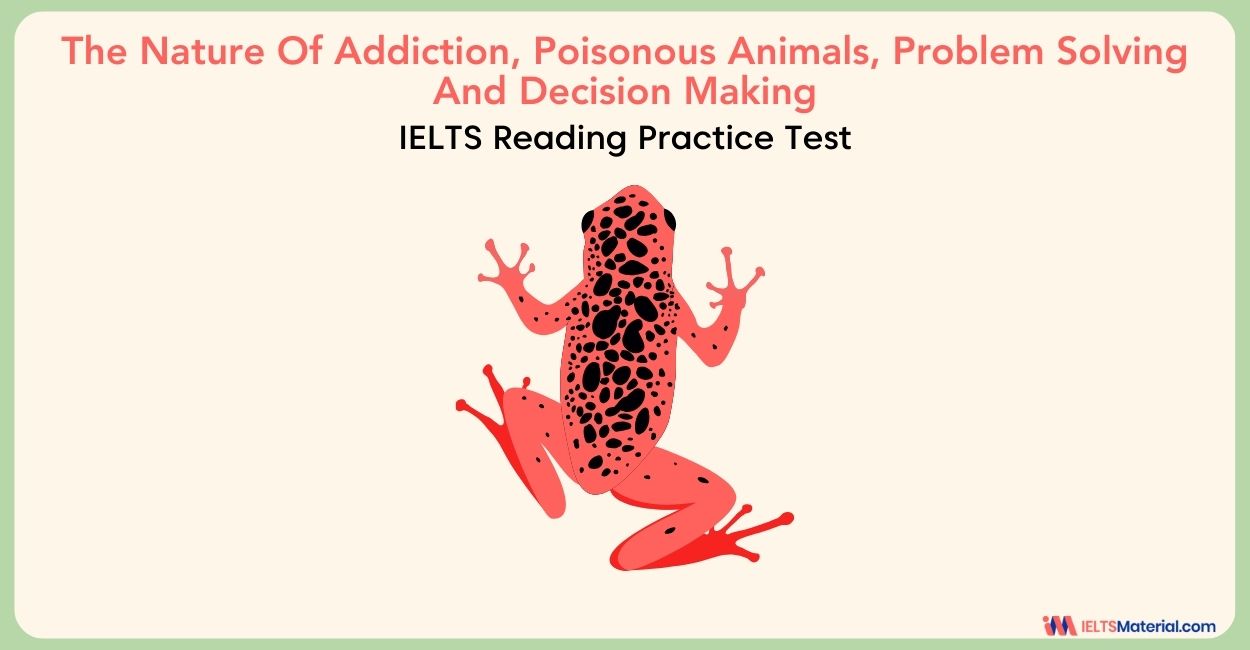The Nature Of Addiction, Poisonous Animals, Problem Solving And Decision Making Reading Answers
Table of Contents
Limited-Time Offer : Access a FREE 10-Day IELTS Study Plan!
You will have 60 minutes to complete IELTS Academic Reading, which consists of 40 questions in total. To make that possible, you have to regularly practice IELTS Reading practice tests along with passages like ‘The Nature Of Addiction’, ‘Poisonous Animals’ and ‘Problem Solving And Decision Making’.
The types of question given in this reading test are:
- IELTS Reading Matching Headings to Paragraph
- Short answer Questions IELTS Reading
- Matching Information IELTS Reading
- True/False/Not Given IELTS Reading
- IELTS Reading Matching Features
- IELTS Reading Flowchart Completion
- IELTS Reading Yes/No/Not Given
Set your timer and take the test now!
Reading Passage 1
You should spend about 20 minutes on Questions 1-12, which are based on the Reading Passage below.
Find the practice test with The Nature Of Addiction PDF here.
The Nature Of Addiction
Questions 1-6
Reading Passage 1 has seven paragraphs A-G. Choose the correct heading for paragraphs B to G from the list of headings below.
Write the correct number i-x in boxes 1-6 on your answer sheet.
List of Headings
i. A change in methods
i. The falling level of addiction
iii. Biological changes and associated risks
iv. The long term damage of addiction
v. Disagreements about definition
vi. Advice for those involved
vii. The changing nature of addiction in children
viii. The lack of clarity in modem interpretations of addiction
ix. Modern label for taking addiction to extremes
x. Not all addictions are cause for concern
Example: Paragraph A; Answer: viii
1 Paragraph B
2 Paragraph C
3 Paragraph D
4 Paragraph E
5 Paragraph F
6 Paragraph G
Questions 7-12
Answer the questions below.Choose NO MORE THAN THREE WORDS from the passage for each answer.
Write your answers in boxes 7-12 on your answer sheet.
7 It is increasingly difficult to differentiate between addiction and what?
8 What can soft addictions lead to a decline in?
9 Addictions that involve the consumption of a drug and have a clear connection with what?
10 What specific addiction has increased considerably over recent years?
11In some cases, addictions should actually be labelled as to what?
12 Extreme addictions often have what kind of root cause?
Reading Passage 2
You should spend about 20 minutes on Questions 14-27, which are based on the Reading Passage below.
Find the practice test with the Poisonous Animals PDF here.
Poisonous Animals
Questions 13-15
A Poisonous creatures
B Venomous creatures
C Both poisonous and venomous creatures
13 are protected by secretions on their skin.
14 are often coloured to match the environment.
15 aggressively use toxins.
Questions 16-22
Do the following statements agree with the information given in Reading Passage 2?
In boxes 16-22 on your answer sheet write
TRUE, if the statement agrees with the information
FALSE, if the statement contradicts the information
NOT GIVEN,if there is no information on this
16 There is a common misunderstanding of the difference between poisonous and venomous
17 Significant environmental disasters are more damaging than animals
18 The poison dart frog obtains its poison from its environment
19Touching a puffer fish can cause paralysis
20 The Brazilian Wandering spider kills more people every year than any other venomous creature
21 The box jellyfish can cause death by drowning
22 The tentacles on a box jellyfish are used for movement
Questions 23-26
Answer the questions below.
Choose NO MORE THAN THREE WORDS from the passage for each answer.
Write your answers in boxes 23-26 on your answer sheet.
23 What do the people of South and Central America principally use poisoned blow darts for these days?
24 The venom of which creature can be neutralized if medical intervention is swift?
25 Where does the Brazilian Wandering spider often sleep?
26 After whom does the box jellyfish have its other name?
Reading Passage 3
You should spend about 20 minutes on Questions 27-40, which are based on the Reading Passage below.
Find the practice test with the Problem-Solving And Decision Making PDF here.
Problem-Solving And Decision Making
Questions 27-33
Match each statement with the correct person.
Write the correct answer A-D in boxes 27-33 on your answer sheet.
27 A successful solution can only be found when there is a clear corporate structure for decision making.
28 Decisions made without full consideration of the details are a potential by-product of pressure.
29 Decision making that does not look into motives for the issue is the primary reason for continued problems.
30 Poor decision making is the most easily identified form of weak managerial ability.
31 Seeking a staff member on whom responsibility can be placed can have negative effects.
32 Decision-making abilities are at least partly formulated long before they have any business application.
33 Long term solutions can only be found by asking the right questions.
List of People
A Marie Scribe
B Martin Hewings
C Garen Filke
D Anne Wicks
E John Tate
Questions 34-37
Complete the flowchart below.
Choose ONE WORD ONLY from the passage for each answer.
Write your answers in boxes 34 to 37 on your answer sheet.
| ACTIONS
what we opt to either do or not do |
| ↑ |
| APTITUDES
can be short term and relate to 37_____________ at a particular time |
| ↑ |
| 36_________________
could lead to complications when reacting to others |
| ↑ |
| BELIEFS
possibly only personally held beliefs, not necessarily universally 35 _______________ |
| ↑ |
| 34_______________
conditioned to react; often influenced by place of birth |
Questions 38-40
Do the following statements agree with the views given in Reading Passage 3?
In boxes 38-40 on your answer sheet write
YES, if the statement agrees with the views given
NO, if the statement contradicts the views given
NOT GIVEN, if it is impossible to say
38 It is only in recent years that the mental processes behind decision making have been studied.
39 Garen Filke completely disagrees with the conclusion drawn by Martin Hewings.
40 John Tate believes that successful decision making is not related to psychology.
Answers
Now it’s time to check the answers to the above questions from the passages – ‘The Nature Of Addiction’, ‘Poisonous Animals’ and ‘Problem Solving And Decision Making’ – and improve your reading skills for a better IELTS band score.
The Nature Of Addiction Reading Answers (Passage 1)
| 1 | x
The writer refers to soft addictions as having been labelled ‘tongue-in-cheek’ and is not dangerous or life-threatening. |
| 2 | iii
The paragraph focuses on how substances react with the brain (biological) and that addiction does have health dangers (risks) and is linked to crime (risks again). |
| 3 | ix
This form of addiction is ‘a relatively new entrant to the field’ (hence ‘modern label’) and refers to when addiction go beyond safe limits and become ‘excessive’ (hence ‘extremes’) |
| 4 | v
The key phrase here is ‘significant controversy’ which refers to the disagreements, and the paragraph then talks about the difficulty of identifying between soft and extreme addiction, as well as some opinions that these are not addictions at all, but are instead disorder or compulsions. |
| 5 | i
The paragraph focuses on the difference between ‘the old methods’ and more modern forms of treatment, so covers a change in methods. |
| 6 | vi
This is the only paragraph that offers advice (support their recovery, don’t help to conceal addiction etc.) |
| 7 | (An) interest
(paragraph A – ‘the lines between addiction and interest are far harder to identify’) |
| 8 | Productivity
(paragraph B – ‘This category is referred to as soft addiction and is generally related only to a potential loss of productivity’) |
| 9 | Crime
(paragraph C – ‘leading to the very strong connection between drug abuse and crime.’) |
| 10 | Gambling
(paragraph D – ‘…concerns like excessive gambling… a vast increase in this form of addiction.) |
| 11 | Impulse control disorders
(paragraph E – “addiction’ … actually mislabelled … should be referred to as ‘Impulse control disorders’.) |
| 12 | Psychological
(paragraph H – ‘Often, extreme addictions – both substance-based and behavioural – stem from a psychological root’) |
Poisonous Animals Reading Answers (Passage 2)
Unlock Answer
Signup/Login and get access to the answers
| 13 | A
(‘usually secrete toxins through their skin’) |
| 14 | B
(‘camouflaged to blend in with their surroundings, making them more efficient hunters.’) |
| 15 | B
(poisonous creatures use toxins, but not aggressively) |
| 16 | Not given
(we are only told that ‘it is important to draw a distinction between those that are considered poisonous and those that are venomous’ – there is no reference as to whether there is a common misunderstanding about the difference.) |
| 17 | False
(‘natures more cataclysmic risks… fade in comparison to the dangers presented by the more aggressive flora and fauna around the world ) |
| 18 | True
(‘when bred in captivity, the dart frog is not actually poisonous – it generates its protection from its diet of poisonous ants, centipedes and mites.’) |
| 19 | False
(‘not … externally dangerous, its extremely high levels of toxicity cause rapid paralysis and death when ingested ‘ ֊ so when it is eaten, not when it is touched) |
| 20 | Not Given
(‘is responsible for the most number of human deaths of any spider’ – but we don t know if this is the most of ALL venomous creatures) |
| 21 | True
(‘can cause human victims to go in shock, drown or die of heart failure before even reaching shore’) |
| 22 | Not Given
We only know that the tentacles are used to sting. |
| 23 | Hunting
(‘tiny amounts of this poison onto blow darts used by the native population for hunting1) |
| 24 | Inland Taipan
(there is also a known antivenin (cure), although this needs to be administered quickly.’) NOTE: writing only Taipan’ would not be enough to get a point. |
| 25 | Populated areas
(‘hiding during daytime in populated areas’) |
| 26 | Medusa
(The box jellyfish has tentacles that can be as long as 10 feet (hence their other name ‘Fire Medusa’ after Medusa, a mythological character who had snakes for hair). |
Problem Solving And Decision Making Reading Answers (Passage 3)
| 27 | E (John Tate) |
| 28 | A (Marie Scrive) |
| 29 | B (Martin Hewings) |
| 30 | A (Marie Scrive) |
| 31 | C (Garen Filke) |
| 32 | D (Anne Wicks) |
| 33 | B (Martin Hewings) |
| 34 | Programming |
| 35 | True |
| 36 | Feelings |
| 37 | Mood |
| 38 | Not Given
It only says analysed and taught, and the text-only refers to a business context (the question does not identify this). |
| 39 | No – Not complete
He refers to the results as ‘potential encouraging՛ |
| 40 | Yes
‘more psycho-analytical approach to problem-solving has little place in a business decision’ – a point of view held by John Tate. |
Also check:
Practice IELTS Reading based on question types
Start Preparing for IELTS: Get Your 10-Day Study Plan Today!
Explore other Reading Practice Tests

Nehasri Ravishenbagam

Courtney Miller
Recent Articles

Kasturika Samanta

Kasturika Samanta

Janice Thompson





Post your Comments
1 Comment